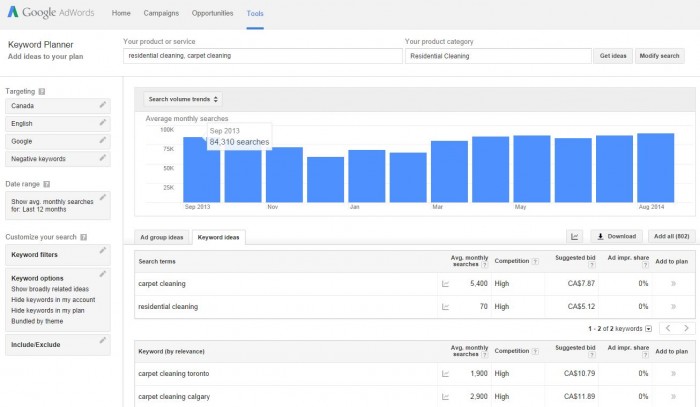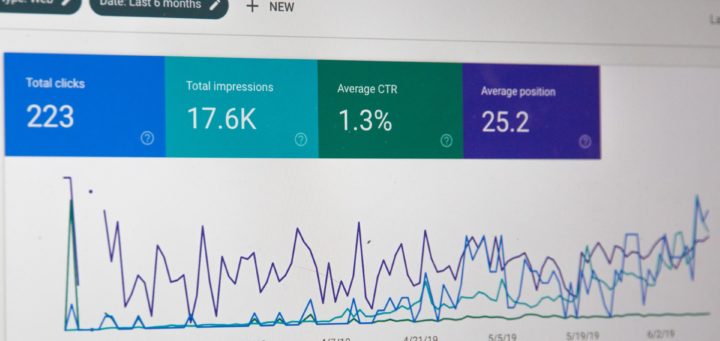Getting Started with Keyword Research
Keyword research is one of the most important pieces of search engine optimization to understand. Your customers type specific keywords into a search box and expect to find the results they are looking for; your job is to make sure that those keywords lead the search to your website. In order to make sure your site is filled with the relevant keywords that your customers will be searching for, you need to do your work with research, and take advantage of all of that traffic!
Effective keyword research will tell you what topics people are interested in, and what language they are using in their search. But first, let’s start with the basics: what exactly are keywords and how do they work?
How Do Keywords Work?
Open a page on your website and try to describe the information on that page in 3 to 5 words. These words or phrases that you come up with are keywords, and they represent the content of a web page in a way to make it more easily found by search engine spiders when someone types a query into a search box. Some keywords can be searched thousands and thousands of times a day, while others get much less traffic; using keywords with high search volume may not always be a smart move, as they may be in high use by your competitors as well.
Keyword research allows marketers to incorporate relevant terms into each website page through content text, meta titles and meta descriptions. It will also help them to understand what consumers are typing when searching for your products or services; this information can prove to be invaluable in target marketing. For example, if you sell residential cleaning services and your keyword research finds that consumers are actively searching for “residential carpet cleaning”, you can then embed keywords related to carpet cleaning into your content and meta information to target these customers. Then, the next time that a consumer types in “residential carpet cleaning”, Google will find your website to have a number of keyword matches, and may return your website high on the results page (depending on several other ranking factors in their algorithm), increasing your SERP rank and potential click-thru results.
How to Find Keywords
Step 1: Brainstorm
In our opinion, this is the fun part – brainstorming! As mentioned above, hit your landing pages and come up with a list of words or phrases that best describe the content on each page. These words should be distinct to your business, services and offerings. Think about how your consumers would ask for your services/products, or how you would search for your own services/products online. Is location important (ie: “carpet cleaning vancouver”)? What about adding some modifiers, like “‘how to’ carpet clean” or “‘why use’ a steam vacuum”? Go wild at this point and try to come up with as many variations as possible, while still maintaining a relevant link to your distinctive offerings.
It could also be useful to visit a competitor’s website and check out what keywords they reference frequently throughout their content. There’s no harm in borrowing a few words or phrases!
Step 2: Use a Keyword Tool
No matter how creative you are in Step #1, you could always use the help of a free software tool. We recommend Google Adword’s Keyword Tool to get started (although there are many other free and paid tools out there for you to use). Google’s tool suggests additional keywords based off of some initial information, and provides reporting on search volumes, cost estimates for running campaigns for specific words, and competition levels. The higher the competition, the more websites there are competing with you for the same keyword in the AdWords auction (keep in mind, this isn’t the same thing as organic search competition).
Your brainstorm and keywords tool list should now be quite healthy (at least 200 – 300 rows, and sometimes much more), and it’s time to analyze and refine it. Go line by line through each keyword listed and remove any negative keywords that you don’t want to be ranking for (for example, if you do not offer commercial cleaning services and don’t want to rank for any keywords containing the word “commercial”).
It’s also important to look at the Average Monthly Search Volume as detailed by the Google Adword’s Keyword Tool, along with phrase competition in the organic search results, as you want to pick keywords that are already highly searched for, with low competition (and filter out any words with high competition or low search volume).
The most important thing to remember with keyword research is not to try and trick the Google spiders; if you’ve come up with some great keywords that don’t really match the content on your landing page, don’t keep it. Either come up with another word that will more accurately match your page content, or write a new, separate page centered around this new keyword. You may even find that you will need to rewrite some of your pre-existing content based on your keyword research results, if your current text can’t incorporate the keywords properly.
4. Implement, Monitor and Redefine
The best way to find out if your new keywords are working is to test them. Update your site to incorporate your refined list of keywords – in your page content, image titles, page meta titles and page meta descriptions – and use your handy Google Analytics account to track their engagement rates. You can also use a keyword ranking tool to see which keywords are ranking your website highest on the SERPs.
Continual monitoring will tell you which keywords are ineffective, and allow you to add new ones that may bring in better results. Adding, removing and updating keywords is an ongoing process as trends will change over time.
We hope that clarifies the basics of the Keyword Research process for you, and makes it a bit easier for you to get started. It really is a bit of a trial and error process, as you find which keywords work best for your website and the consumers searching for your website. If you have any questions or would like help with your keyword research and search engine optimization, please contact us today.
Are there any other keyword research tools that you love to use and would recommend? Please leave us a note in the comments below!





